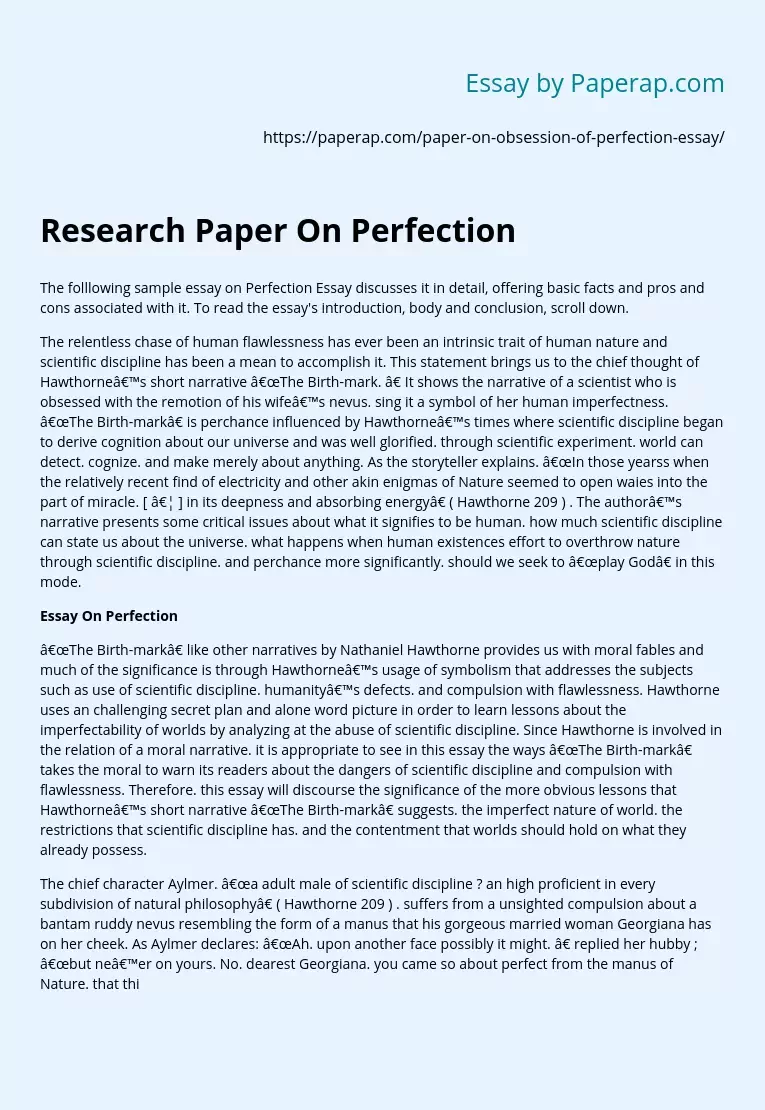The folllowing sample essay on Perfection Essay discusses it in detail, offering basic facts and pros and cons associated with it. To read the essay’s introduction, body and conclusion, scroll down.
The relentless chase of human flawlessness has ever been an intrinsic trait of human nature and scientific discipline has been a mean to accomplish it. This statement brings us to the chief thought of Hawthorne’s short narrative “The Birth-mark. ” It shows the narrative of a scientist who is obsessed with the remotion of his wife’s nevus.
sing it a symbol of her human imperfectness. “The Birth-mark” is perchance influenced by Hawthorne’s times where scientific discipline began to derive cognition about our universe and was well glorified. through scientific experiment. world can detect. cognize. and make merely about anything. As the storyteller explains. “In those yearss when the relatively recent find of electricity and other akin enigmas of Nature seemed to open waies into the part of miracle.
[ … ] in its deepness and absorbing energy” ( Hawthorne 209 ) . The author’s narrative presents some critical issues about what it signifies to be human. how much scientific discipline can state us about the universe. what happens when human existences effort to overthrow nature through scientific discipline. and perchance more significantly. should we seek to “play God” in this mode.
Essay On Perfection
“The Birth-mark” like other narratives by Nathaniel Hawthorne provides us with moral fables and much of the significance is through Hawthorne’s usage of symbolism that addresses the subjects such as use of scientific discipline.
humanity’s defects. and compulsion with flawlessness. Hawthorne uses an challenging secret plan and alone word picture in order to learn lessons about the imperfectability of worlds by analyzing at the abuse of scientific discipline. Since Hawthorne is involved in the relation of a moral narrative. it is appropriate to see in this essay the ways “The Birth-mark” takes the moral to warn its readers about the dangers of scientific discipline and compulsion with flawlessness. Therefore. this essay will discourse the significance of the more obvious lessons that Hawthorne’s short narrative “The Birth-mark” suggests. the imperfect nature of world. the restrictions that scientific discipline has. and the contentment that worlds should hold on what they already possess.
The chief character Aylmer. “a adult male of scientific discipline ? an high proficient in every subdivision of natural philosophy” ( Hawthorne 209 ) . suffers from a unsighted compulsion about a bantam ruddy nevus resembling the form of a manus that his gorgeous married woman Georgiana has on her cheek. As Aylmer declares: “Ah. upon another face possibly it might. ” replied her hubby ; “but ne’er on yours. No. dearest Georgiana. you came so about perfect from the manus of Nature. that this slightest possible defect ? which we hesitate whether to term a defect or a beauty ? dazes me. as being the seeable grade of earthly imperfection” ( Hawthorne 209 ) . He seeks to take his wife’s nevus. the symbol of needfully flawed humanity. and do her perfect.
Georgiana’s nevus represents man’s imperfectnesss. the very imperfectnesss that make her homo. The nevus is profoundly deep-rooted in her face. “It was the fatal defect of humanity which Nature. in one form or another. casts ineffaceably on all her productions. either to connote that they are impermanent and finite. or that their flawlessness must be wrought by labor and pain” ( Hawthorne 211 ) . We can presume that. symbolically. this transition implies that man’s imperfectnesss are profoundly embedded in his nature. “The Birthmark” illustrates the defects of world. but its most important declaration is that to be human is necessarily to be flawed. To fight for flawlessness is to deny human’s ain nature. to deny what makes us human. and to accomplish such flawlessness is basically impossible. It becomes clear when the storyteller of the narrative describes Georgiana’s decease “The fatal manus had grappled with the enigma of life. and was the bond by which an angelic spirit kept itself in brotherhood with a mortal frame.
As the last red shade of the birthmark–that sole item of homo imperfection–faded from her cheek. the separating breath of the now perfect adult female passed into the ambiance. and her psyche. lingering a minute near her hubby. took its heavenward flight” ( Hawthorne 222 ) . by extinguishing Georgiana’s imperfectness. Aylmer besides liberates her of her humanity. Once she is perfect. once she is no longer flawed. Georgiana can no longer live. Hawthorne’s message is that being imperfect is merely portion of being human. If you are non flawed. you are non human any longer. It seems so ; that the cardinal lesson and implicit in moral message behind this transition is that seeking to set a little error manner up out of proportion. in effort to make something perfect. merely destroys a good thing and leave us with the fatal effects that come with mindless compulsion of prosecuting flawlessness.
Another illustration of a moral lesson that Hawthorne’s short narrative “The Birth-mark” suggests is that scientific discipline truly does hold its restrictions. There are certain things that worlds are non privileged to cognize or capable of making. It is non merely chesty. the narrative seems to implies. but perfectly unsafe to seek to play God. “Much as he had accomplished. she could non but observe that his most glorious successes were about constantly failures [ … ] His brightest diamonds were the merest pebbles. and felt to be so by himself. in comparing with the incomputable treasures which lay hidden beyond his reach” ( Hawthorne 217 ) . Aylmer can non detect everything about Nature ; he has failed in his past experiments and he will neglect once more with Georgiana. One of the many ethical motives of the narrative is that Nature carefully protects her secrets and can non be overcome or even matched by adult male.
As we discuss in the debut of this essay. Hawthorne wrote “The Birthmark” at a clip when the scientific method was being glorified and people were get downing to believe scientific discipline truly could take us anyplace we wanted to travel. “The Birthmark” is showing Nature as the personified Godhead of all things. as a God. There are deductions in the narrative about moral ethical issues as scientific discipline trials new drugs in human existences for case. or scientists playing to be god like in the instance of human cloning. Finally. it delivers the moral about what happens when human existences effort to dispute and change nature that can and frequently will stop in tragic effects.
Aylmer’s gorgeous married woman. Georgiana is extremely desirable because of her beauty. The storyteller describes her. declaring: “Georgiana’s lovers were wont to state that some faery at her birth hr had laid her bantam manus upon the infant’s cheek. [ … ] to give her such sway over all hearts” ( Hawthorne 210 ) . She is perfect in every manner. except for one bantam defect that Aylmer can’t accept. “At all the seasons which should hold been their happiest. he constantly [ … ] opened his eyes upon his wife’s face and recognized the symbol of imperfection” ( Hawthorne 211 ) . Aylmer is more and more bothered by his wife’s nevus. He grows to happen it absolutely unbearable. and even depict it “as the symbol of his wife’s liability to transgress. sorrow. decay. and death” ( Hawthorne 211 ) . The compulsion with flawlessness blinds Aylmer to the true beauty and humanity of his married woman. demoing the battle between accepting her true natural beauty and man’s inability to comprehend it and appreciate what nature has bestowed upon him.
As the narrative revels through this of import quotation mark “Do non repent [ … ] you have rejected the best the Earth could offer” ( Hawthorne 222 ) . Hawthorne’s critical lesson is that Aylmer didn’t acknowledge how lucky he was to hold Georgiana. At the terminal of the narrative Aylmer is punished for being dissatisfied with a adult female who pledged her love and entrusted her life to him. a adult female whose inner and outer beauty he could non see and his discontentedness snap away the most perfect thing in his life. Georgiana. Contentment on what we have is the cardinal lesson of this transition when sometimes ; it is adequate to merely complete a undertaking. even if it is non perfect because endeavoring to do it hone could stop up botching many things in the procedure.
At the terminal of “The Birthmark. ” Aylmer both succeeds and fails. He succeeds in that he eventually free his married woman of her nevus. He fails in that…she is dead. Finally. this narrative affect man’s desire to prefect what is already perfect and the usage of scientific discipline as a blemished tool to achieve this flawlessness. Certain. Georgiana dies right afterwards. but the fact remains that Aylmer does so win in taking the nevus from Georgiana’s cheek. What does this state about man’s ability to suppress nature? “The terminal justifies the agencies. ” You can utilize bad or immoral methods every bit long as you accomplish something “good” by utilizing them. It is acceptable to make something bad in order to obtain something good?
Plants Cited
Hawthorne. Nathaniel. ”The Birth-mark” . Pearson Custom Library Introduction to Literature. Eds. Cain. Kathleen Shine. Kathleen Fitzpatrick. JN. et. Al. Boston: Pearson Learning Solution. 2013. 209-222. Print.
Research Paper On Perfection. (2019, Dec 07). Retrieved from https://paperap.com/paper-on-obsession-of-perfection-essay/

